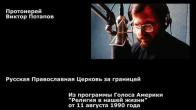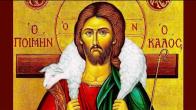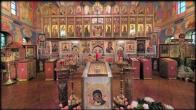You are here
What Is the Orthodox Church?
What Orthodox Christians Believe
If you have visited an Orthodox Church, you will have found that much is strange and different from other churches you may have attended. It is more than the language and service which may puzzle you, for the latter could be in any one of many languages, including English. What is this Church?
Almost two thousand years ago, Jesus Christ, the Son of God, came to earth and founded the Church, through His Apostles and disciples, for the salvation of man. In the years which followed, the Apostles spread the Church and its teachings far; they founded many churches, all united in faith, worship, and the partaking of the Mysteries (or as they are called in the West, the Sacraments) of the Holy Church. The churches founded by the Apostles themselves include the Patriarchates of Constantinople, Alexandria, Antioch, Jerusalem, and Rome. The Church of Constantinople was founded by St. Andrew, the Church of Alexandria by St. Mark, the Church of Antioch by St. Paul, the Church of Jerusalem by Sts. Peter and James, and the Church of Rome by by Sts. Peter and Paul. Those founded in later years through the missionary activity of the first churches were the Churches of Sinai, Russia, Greece, Serbia, Bulgaria, Romania, and many others.
Each of these churches is independent in administration, but, with the exception of the Church of Rome, which finally separated from the others in the year 1054, all are united in faith, doctrine, Apostolic tradition, sacraments, liturgies, and services. Together they constitute and call themselves the Orthodox Church. The teachings of the Church are derived from two sources: Holy Scripture, and Sacred Tradition, within which the Scriptures came to be, and within which they are interpreted. As written in the Gospel of St. John, "And there are also many other things which Jesus did, the which, if they should be written every one, I suppose that even the world could not contain the books that should be written" (21:20). Much teaching transmitted orally by the Apostles has come down to us in Sacred Tradition.
The word Orthodox literally means "right teaching" or "right worship", being derived from two Greek words: orthos, "right," and doxa, "teaching" or "worship." As the encroachments of false teaching and division multiplied in early Christian times, threatening to obscure the identity and purity of the Church, the term "Orthodox" quite logically came to be applied to it. The Orthodox Church carefully guards the truth against all error and schism both to protect its flock and to glorify Christ whose body the Church is.
An astonishing number of religious groups today claim to be the successors of the early Church. A "yardstick for truth" is needed by which to compare what the Church originally believed and practiced with what these groups proclaim. Certainly we all have the right to believe whatever we choose. But it is also just good sense to be acquainted with the options before we make our final choices.
It is our hope that this outline of our beliefs will help introduce you to the Christianity espoused and instituted by the Apostles of Jesus Christ. This is the yardstick of truth by which our choices in Christianity need to be measured.
ECUMENISM. One has to welcome rejection of the age-old separation of Christians, but only if this is done with the objective of disclosing the treasures of Orthodoxy, to bring those who have fallen away from the Church back to unity in Orthodoxy.
The attitude of the Russian Orthodox Church Abroad toward ecumenism has always been of a sober, strictly Orthodox character, in accordance with the teachings of the Holy Fathers. The outlook of our Church was particularly well-defined in a statement issued on December 31, 1931, when the Russian Church Abroad appointed its representative to the Committee for the Continuation of the World Conference on Faith and Order:
"Preserving the Faith is the One, Holy, Catholic and Apostolic Church, the Synod of Bishops confesses that the Church has never been divided. The issue lies only in who does and who does not belong to Her. Moreover, the Synod of Bishops fervently welcomes all attempts by the heterodox to study the teaching of Christ about the Church, in the hope that through such investigation, especially with the participation of representatives of the Holy Orthodox Church, they will eventually arrive at the conviction that the Orthodox Church, which is the "pillar and the ground of truth" (I Timothy 3:15), has fully and without any adulteration retained the doctrine taught by Christ the Savior to His disciples."
The Ecumenical Movement takes as its guiding principle the Protestant view of the Church. Protestants hold that there is no single truth and no single visible Church, but that each of the many Christian denominations possesses a particle of the truth, and that these relative truths can, by means of dialogue, lead to the One Truth and the One Church. One of the ways of attaining this unity, as perceived by the ideologues of the Ecumenical Movement, is the holding of joint prayers and religious services, so that in time communion from a common chalice (intercommunion) may be achieved.
Orthodoxy can never accept such an ecclesiology. It believes and bears witness that there is no need to assemble particles of the truth, since the Orthodox Church is the repository of the fullness of the Truth, which was given to Her on the day of Holy Pentecost.
For the Orthodox, joint prayer and Communion at the liturgy is an expression of an already existing unity within the bounds of the One, Holy, Catholic and Apostolic Church. St. Irenaeus of Lyons (2nd century) concisely expressed this: "Our Faith is in accord with the Eucharist, and the Eucharist confirms our Faith." The Holy Fathers of the Church teach that the members of the Church comprise the Church - the Body of Christ - because in the Eucharist they partake of the Body and the Blood of Christ. Outside the Eucharist and Communion there is no Church. Communing together would be an admission that all those receiving Communion belong to the One Apostolic Church, whereas the realities of Christian history even of our time unfortunately point out the deep dogmatic and ecclesiastical division of the Christian world.
PARISH LIFE
Address of our Cathedral
Subscribe to our mailing list
While all the materials on this site are copyrighted, you may use them freely as long as you treat them
with respect and provide attribution on the Russian Orthodox Cathedral of St.John the Baptist of Washington DC.









